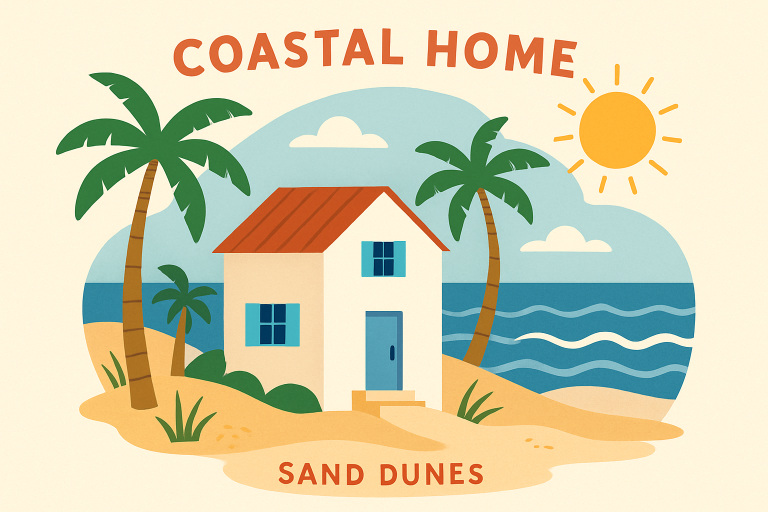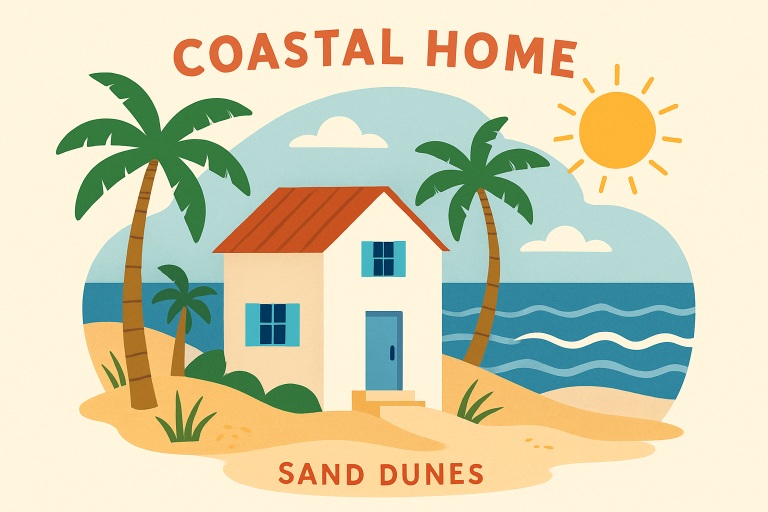Coastal properties differ from landlocked homes due to unique environmental conditions and strict regulations. What seems like the perfect beachside escape may hide challenges, from maintenance costs to insurance. This guide outlines key steps to ensure your coastal home purchase meets your needs and protects your investment. Remember, coastal communities often have vibrant cultures and market trends. These areas are competitive, with sought-after properties selling quickly. Research and experienced local professionals are essential for success.
Purchasing a coastal home is a dream for many, filled with breathtaking views, fresh ocean breezes, and a unique sense of tranquility. Yet, finding the perfect property along the coast requires careful consideration. From navigating flood zones and local building codes to making sure your new home can withstand coastal weather, informed decision-making is essential. If you are considering living in a coastal paradise, such as exploring Hilton Head Island homes for sale, it’s important to fully understand the complexities of coastal real estate before taking the next step.
In addition to understanding real estate specifics, prospective buyers should also weigh the lifestyle changes that come with coastal living. Whether you prioritize storm safety or sustainable design, each aspect plays a role in your long-term satisfaction. For those looking to make this dream a reality, preparation and local expertise are invaluable allies. To further explore general guidance on home buying, major publications like Realtor.com offer helpful resources about purchasing waterfront properties.
Understanding Local Regulations
Many coastal zones have stringent zoning restrictions and building codes to protect the natural environment and ensure public safety. These may include rules about how close to the water you can build, home elevation requirements to prevent flood damage, or regulations on landscaping to prevent shoreline erosion. Review local ordinances in the location you’re interested in—your real estate agent and local zoning offices are invaluable resources for specific guidance.

Assessing Environmental Risks
Coastal homes face natural hazards not typical of inland properties, including hurricanes, tidal flooding, storm surges, and shoreline erosion. Conduct a detailed risk assessment by reviewing the property’s elevation, proximity to flood zones, and historic weather data. Consulting with specialists in coastal engineering and insurance providers will help identify practical modifications or confirm the property is suitable for your needs.
Choosing the Right Builder
Coastal construction requires an experienced builder adept at mitigating storm damage and salt air corrosion. Key attributes include local experience for navigating codes and environmental factors, resilient design with impact-resistant windows and elevated structures, and the use of specialty salt- and humidity-resistant materials for durability. Recommendations can be sourced from local homebuilders’ associations or online reviews.
Incorporating Sustainable Design
Coastal homeowners benefit from eco-friendly features that lower utility costs and mitigate environmental impact. Solar panels, high-efficiency appliances, and native landscaping are leading options. Using native plants minimizes water usage and promotes local biodiversity, while sourcing sustainable materials aids in environmental stewardship. Energy-efficient homes can boost both comfort and long-term property value for buyers.
Budgeting for Maintenance
Homes near the ocean need regular upkeep to combat salt air, humidity, and severe weather. Set aside funds for preventing corrosion by inspecting metal features, controlling mold with proper ventilation and moisture-resistant materials, and preparing for storms by reinforcing roofs, windows, and doors. This proactive maintenance protects against deterioration and preserves property value.
Obtaining Adequate Insurance
Standard home insurance typically excludes risks inherent to coastal living, necessitating specialized coverage. This may include flood insurance, often mandated in coastal zones and available through programs like FEMA’s National Flood Insurance Program, and hurricane/wind damage insurance for properties in hurricane-prone regions. Homeowners intending to rent their property should also consider loss of rental income insurance. Consulting with an insurance professional is recommended to customize coverage based on regional factors and individual property requirements.
Working with Local Experts
Partnering with local real estate agents, insurance agents, builders, and inspectors offers significant advantages due to their in-depth knowledge of the market and regulatory environment. These specialists can provide crucial services such as analyzing market trends to advise on property values and optimal purchase timing, ensuring regulatory compliance by guiding clients through zoning laws, building codes, and permit processes, and conducting risk assessments to identify environmental hazards and suggest mitigation strategies. Ultimately, leveraging this local expertise empowers individuals to purchase or construct their desired coastal property confidently.
Evaluating Resale Value
When purchasing coastal property, which is often an emotional and lifestyle choice, consider these investment aspects to maximize future resale value: prioritize location near key amenities for higher appreciation rates, opt for modern, sustainable designs that appeal to more buyers due to energy efficiency and updated features, and maintain thorough documentation of the property’s maintenance history to demonstrate care and value. Addressing these factors ensures a coastal home retains its value and appeal over time, providing peace of mind and long-term enjoyment.
Final Thoughts
Buying or building a coastal home is a rewarding but complex decision that requires careful planning. From understanding local regulations and environmental risks to choosing the right builder and incorporating sustainable design, each step plays a crucial role in ensuring safety, comfort, and long-term value. Factoring in ongoing maintenance, securing the proper insurance, and leveraging local expertise helps safeguard your investment against coastal challenges. By also considering future resale value, homeowners can balance lifestyle enjoyment with financial stability. Ultimately, a well-prepared approach makes coastal living both attainable and sustainable.




